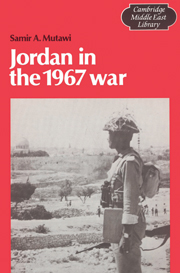Book contents
- Frontmatter
- Contents
- Preface
- Acknowledgement
- Map 1 The Hashemite Kingdom of Jordan
- Map 2 Operations on the Jordanian Front, 5–7 June 1967
- Map 3 The Campaign in Jerusalem, 5–7 June 1967
- 1 The decision-making process in Jordan
- 2 The principles and practice of Jordanian foreign policy
- 3 Friends and enemies: Jordan in inter-Arab affairs
- 4 Samu
- 5 The gathering crisis
- 6 On the brink of war
- 7 The war
- 8 The war in perspective
- 9 The aftermath
- 10 Conclusion
- Appendix Timetable for the movement of Iraqi forces to Jordan
- Biographical note
- Notes
- Bibliography
- Index
3 - Friends and enemies: Jordan in inter-Arab affairs
Published online by Cambridge University Press: 10 December 2009
- Frontmatter
- Contents
- Preface
- Acknowledgement
- Map 1 The Hashemite Kingdom of Jordan
- Map 2 Operations on the Jordanian Front, 5–7 June 1967
- Map 3 The Campaign in Jerusalem, 5–7 June 1967
- 1 The decision-making process in Jordan
- 2 The principles and practice of Jordanian foreign policy
- 3 Friends and enemies: Jordan in inter-Arab affairs
- 4 Samu
- 5 The gathering crisis
- 6 On the brink of war
- 7 The war
- 8 The war in perspective
- 9 The aftermath
- 10 Conclusion
- Appendix Timetable for the movement of Iraqi forces to Jordan
- Biographical note
- Notes
- Bibliography
- Index
Summary
Jordan and the Arabs
Despite strong ties of culture, religion and language the period after the Second World War saw the Arab world deeply divided. Different ethnic groupings, different religious sects, a variety of political parties, disputes over national boundaries, competition between political leaders and the issue of Palestine, led to friction between the nations that made up the area of the Middle East. These divisions, which existed within nations as well as between nations, can be divided into two main blocs: revolutionaries and conservatives. Syria and Egypt belonged to the revolutionary bloc, while Jordan and Saudi Arabia were regarded as conservatives. Following the 1958 revolution Iraq was generally regarded as revolutionary although the rival faction of the Ba'ath Party that ruled Ba'athist Syria denied this.
One of the key issues which divided the conservative and revolutionary states was their attitude towards the West. The revolutionary Arab states condemned association with the West on the grounds that in the past Western countries had exploited the Arab world and continued to do so. The more radical Arab states regarded the destruction of imperialism in all its forms as one of the key objectives of the Arab revolution. This attitude to the West was in contrast with Jordan's and Saudi Arabia's who maintained friendly relations with Western countries, particularly America and Britain, whom they regarded as allies. They did not feel that there was any contradiction between association with Western nations and the advancement of the Arab world.
- Type
- Chapter
- Information
- Jordan in the 1967 War , pp. 46 - 68Publisher: Cambridge University PressPrint publication year: 1987

